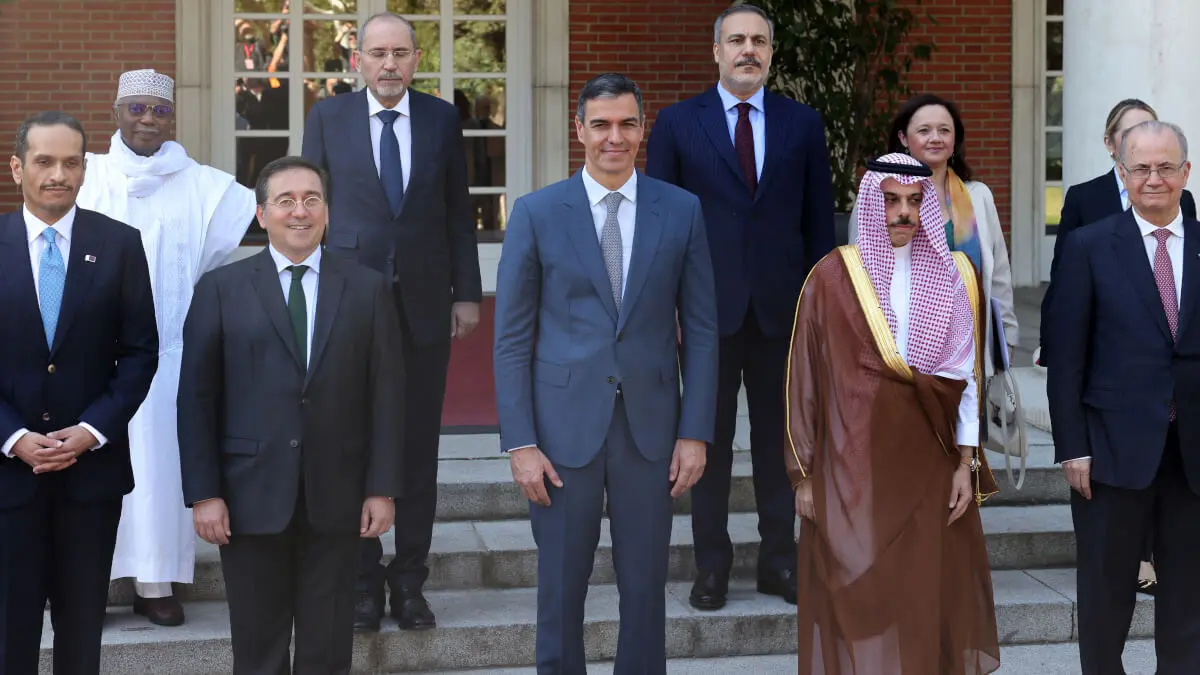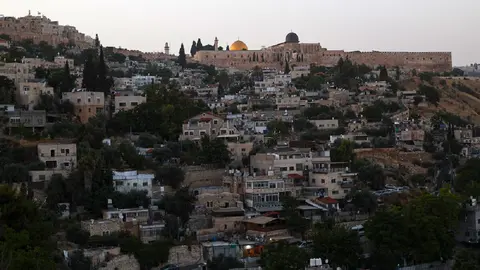Spain receives the backing of Arab countries and Turkey after the recognition of Palestine

The Middle East reacts to Spain's recognition of Palestine. Just one day after this decision, taken jointly with Norway and Ireland, several foreign ministers from Arab countries and Turkey visited Madrid to thank the Spanish government for its stance.
The Spanish President, Pedro Sánchez, together with the Foreign Minister, José Manuel Albares, received representatives of the so-called Gaza Contact Group in Moncloa, made up of the Palestinian Prime Minister, Mohammad Mustafa; the Foreign Ministers of Qatar, Jordan, Saudi Arabia and Turkey, and a representative of the Organisation of Islamic Cooperation (OIC). The head of Egyptian diplomacy, Samé Shukri, is expected to visit Madrid next Monday, as he was unable to attend this meeting.
Ha sido un honor recibir al Comité Ministerial Árabe-Islámico sobre Gaza un día después de que España haya reconocido a Palestina como Estado. Compartimos con los países árabes la voluntad y el compromiso de poner fin a la violencia y hacer realidad la solución de los dos… pic.twitter.com/LeQVG3rEpE
— Pedro Sánchez (@sanchezcastejon) May 29, 2024
They all thanked Spain for this decision, which they described as ‘correct’, ‘courageous’ and ‘historic’. They also reiterated their commitment to continue working together to stop the war in Gaza and to continue making progress in the development of the Palestinian state.
Palestinian Prime Minister Mohammad Mustafa thanked the Spanish government on behalf of the Palestinian Authority and the Palestinian people, while Jordanian Foreign Minister Ayman Safadi urged more European countries to follow in the footsteps of Spain, Norway and Ireland.
Counting Spain and Ireland, there are now nine members of the European Union that officially recognise a Palestinian state. Norway, despite not being a member of the EU's 27 member states, tends to align its foreign policy with Brussels.
EU member Slovenia could join the decision of these three countries, as it will decide this week on the recognition of a Palestinian state and send its decision to parliament for final approval.
Internationally, more than 140 countries recognise a Palestinian state, representing more than two-thirds of the United Nations.
Querido @AymanHsafadi, bienvenido a Madrid. La amistad entre nuestros dos pueblos, España y Jordania, es base de los esfuerzos que ambos países realizamos por la paz y la estabilidad en la región. pic.twitter.com/QDiko90ib7
— José Manuel Albares (@jmalbares) May 28, 2024
Safadi, who considers Madrid's decision to be ‘correct’, also stressed ‘Spain's commitment to respect international law and a peaceful future for the Middle East’, according to RTVE.
For his part, the Saudi Foreign Minister, Prince Faisal bin Farhan, thanked Spain for ‘giving hope in a very dark moment’, ‘for taking the right decision at the right time’ and ‘for being on the right side of history and justice’. The head of Saudi diplomacy stressed that the road to peace ‘passes through the two-state solution’.

For Riyadh, the establishment of a Palestinian state is the main condition for recognising Israel and establishing diplomatic relations, a milestone that would mark a turning point in the region. Indeed, one of Hamas's objectives in launching the 7 October attack was precisely to thwart this peace deal that the US has been working on for years.
Hamas is one of the many proxies used by the Islamic Republic of Iran in the Middle East to expand its influence and defend its interests. An Arab-Israeli alliance is seen by Tehran as a threat, so the Iranian regime has always tried to prevent any rapprochement to push for peace, also opposing the Abraham Accords.
Diplomatic tension with Israel
Spain's decision has received the full backing of the Arab-Islamic world, although this recognition has also provoked a diplomatic crisis between Madrid and Jerusalem. Israel sees recognition of Palestine at this time - in the midst of a war and after the 7 October attack - as a reward for Hamas, which is still holding more than 100 Israelis hostage, including women, the elderly and two children.
Lamento tener que regresar a Israel por unas decisiones vanas adoptadas por el gobierno español, que no van a contribuir a la paz y la seguridad en oriente medio, ni van a facilitar la liberación de nuestros 128 secuestrados aún en manos de Hamás.
— Embajadora de Israel 🇮🇱 (@Isr_Amb_Esp) May 23, 2024
Muchas gracias a todos los…
Added to this decision are the controversial words of Vice-President Yolanda Díaz, who assured that Palestine would be free ‘from the river to the sea’, i.e. from the Jordan River to the Mediterranean Sea. This slogan, often used by Hamas or even the Iranian authorities, is considered anti-Semitic, as it advocates the destruction of the state of Israel.
El pueblo israelí y el pueblo español son pueblos amigos. No permitiremos que nos separaréis ni tú, @sanchezcastejon y @Yolanda_Diaz_, ni los miembros de tu gobierno. pic.twitter.com/lVHZ5v84UU
— ישראל כ”ץ Israel Katz (@Israel_katz) May 27, 2024
Following the decision to recognise Palestine at this very moment and these comments, Israel has recalled its ambassador to Madrid and banned the Spanish consulate in Jerusalem from serving Palestinians.










